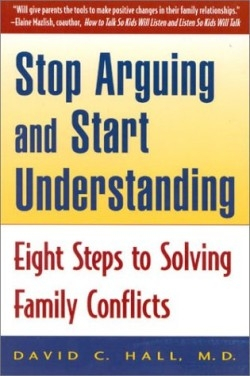Stop Arguing and Start Understanding
Eight Steps to Solving Family Conflicts
Every family encounters situations of conflict. The difference between happy and unhappy families may be traced to their ability to effectively deal with emergent conflict. This book is intended for those families struggling with this issue.
Hall provides a series of eight steps to reducing conflict in the family, including: 1) accepting responsibility, 2) identifying the roots of conflict, 3) putting your own life in order, 4) creating a desirable family culture, 5) asking for help, 6) finding friends, 7) pursuing spiritual health, and 8) refusing to give up. For each step he provides anecdotes from his clinical practice and specific “suggestions for change” in which he includes concrete examples of ways to apply the principle under discussion. The book provides a wealth of information in a series of seven appendices that include suggested readings and resources to contact for additional help.
In Appendix B, Hall lists and discusses nine major psychological disorders such as depression and post traumatic stress disorder (PTSD) with the intention of helping readers to recognize factors which may be adding to their family problems and urging them to seek help if the symptoms sound or feel familiar. At the same time he is careful to add, “If you think you fit the description for any of these disorders, you still may or may not have the disorder.” He urges readers to seek evaluation by a trained professional.
Hall takes a direct but nurturant tone and avoids psychological jargon. When discussing the parental style of “shaming and blaming,” for example, he says: “…stop doing it. …Shaming and blaming deserve a central place on the trash heap of terrible parenting.” He is very careful to focus evaluation on the behaviors, not on the personality of the individuals involved. He reminds readers that they are “responsible (but not to blame)” for the family’s suffering. For example, he is careful to remind readers that parents who use shaming and blaming are not bad people, they are just people who “…learned some destructive ways to treat each other and …need to learn healthier ways in their place.”
The author is a child and adolescent psychiatrist in practice in Seattle, Washington. He trained at the University of Washington where he received a clinical excellence award upon completion of his Child Psychiatry Fellowship in 1983. In 1997, he became president of the national chapter of Physicians for Social Responsibility, the Nobel peace prize-winning group dedicated to preventing war, promoting a sustainable environment, and preventing youth and family violence.
This book is valuable reading for anyone seeking to improve their conflict resolution skills and particularly for parents seeking practical help. Hall provides hope, help, and skills for those who want a more peaceful family life.
Reviewed by
Carol K. Oyster
Disclosure: This article is not an endorsement, but a review. The publisher of this book provided free copies of the book to have their book reviewed by a professional reviewer. No fee was paid by the publisher for this review. Foreword Reviews only recommends books that we love. Foreword Magazine, Inc. is disclosing this in accordance with the Federal Trade Commission’s 16 CFR, Part 255.

